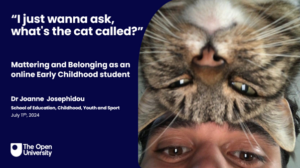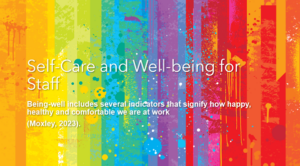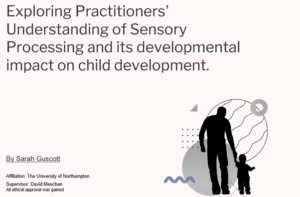Here at the OU we are privileged to work with our validated partner institutions across the UK, supporting the design and delivery of high-quality early childhood programmes that ensure the workforce of future is equipped to deliver the best possible outcomes for babies and young children. An important aspect of these partnerships is the opportunity to share our research and scholarship and discuss the issues and questions that are currently high on our agenda. One way in which we do this is by holding collaborative events and this year’s took place on Thursday 11th July.
The theme of the event was ‘Mattering and belonging: offering learning spaces where Early Childhood students can flourish’ and Jo Josephidou started proceedings by introducing the PRAXIS scholarship project that she is leading on with other EC@OU colleagues, titled ‘I just wanna ask, what’s the cat called? Mattering and belonging as an online Early Childhood student’.

The title came from an incidental comment made by a student during an online focus group session, where another student’s cat walked across the screen prompting the question ‘I just wanna ask, what’s the cat called?’. This seemingly general and unimportant comment actually became a point for reflection, prompting Jo to think about how our distance, online students can make the connections and find points of commonality that are essential in developing their student identity and creating a feeling of mattering and belonging. The project is a longitudinal study using group interviews and monthly reflective email questions to try and capture the journey of the early childhood student and identify what is important to them. Early findings indicate that they feel they have an identity as a higher education student and that this is something they have achieved for themselves and feel proud of, and they can see the impact their studies are having on their roles as parents, carers and practitioners. The project is ongoing and we look forward to finding out what happens next.
The next session was led by Louise Hannan, an Early Childhood Lecturer and PhD student at University Centre Somerset, and Caren Egan, the Nursery Manager at Bridgwater and Taunton College Childcare Centre who presented ‘Self-care strategies to promote staff wellbeing in an Early Years setting: A praxeological study.’

This thought-provoking study considered how the pressures associated with consumerist and capitalist societies can impact negatively on the early years workforce who are already in a vulnerable situation because their work is stressful and requires a large amount of emotional engagement and skill. To counteract these pressures the study looked at ways to empower the nursery practitioners to find ways of valuing themselves for themselves rather than being influenced about what to value by external factors like the media or advertising. The study used photo elicitation to explore practitioners’ ideas of wellbeing generally and their own wellbeing in particular, and a free drawing task that asked them to draw wellbeing ‘radiators and drains’, the things that contributed to their wellness and those that take away from it. The practitioners then engaged in a range of self-care sessions, including breathwork, connecting with nature, yoga, and meditation. Reflecting on the sessions practitioners identified that they felt calmer, more able to give time to situations and to consider their interactions with children and each other. Not every session ‘worked’ for every practitioner but everyone was able to connect to something and see a benefit, and these findings really resonated with the attendees at the event who had lots of questions for Sarah and Caren.
After the questions Sarah Guscott, a HE Practice Tutor and Lecturer in Early Childhood Studies & Primary Education at University Centre Peterborough gave the final presentation, ‘Exploring educators understanding of Sensory Processing and its developmental impact for children’.

Sensory processing relates to the reception, organisation, and interpretation of sensory information by the nervous system which is crucial for various aspects of child development, and which goes beyond the ‘traditional’ five senses to include the vestibular, proprioceptive and interoceptive senses too. Children who have sensory processing difficulties can find it challenging to cope with environments and situations which can affect their behaviour and learning, but there is currently little support for practitioners to identify and support these children. Sarah’s study used qualitative and quantitative questionnaires to gather insights into participants’ experiences and interpretations of sensory processing in young children. The findings indicated that practitioners face significant obstacles due to a lack of training and resources in sensory processing, leading to difficulties in recognising and addressing children’s sensory needs effectively. There was recognition that modifying the environment to reduce sensory overload and implementing individualised interventions resulted in a significant improvement in children’s sensory experiences, but there was need for more professional development in the area to help raise awareness and improve practice.
As the descriptions of the presentations show, the range and quality of research and scholarship being done in the field of Early Childhood is diverse and exciting and it was a pleasure to have the opportunity to hear, learn and discuss this great work.
